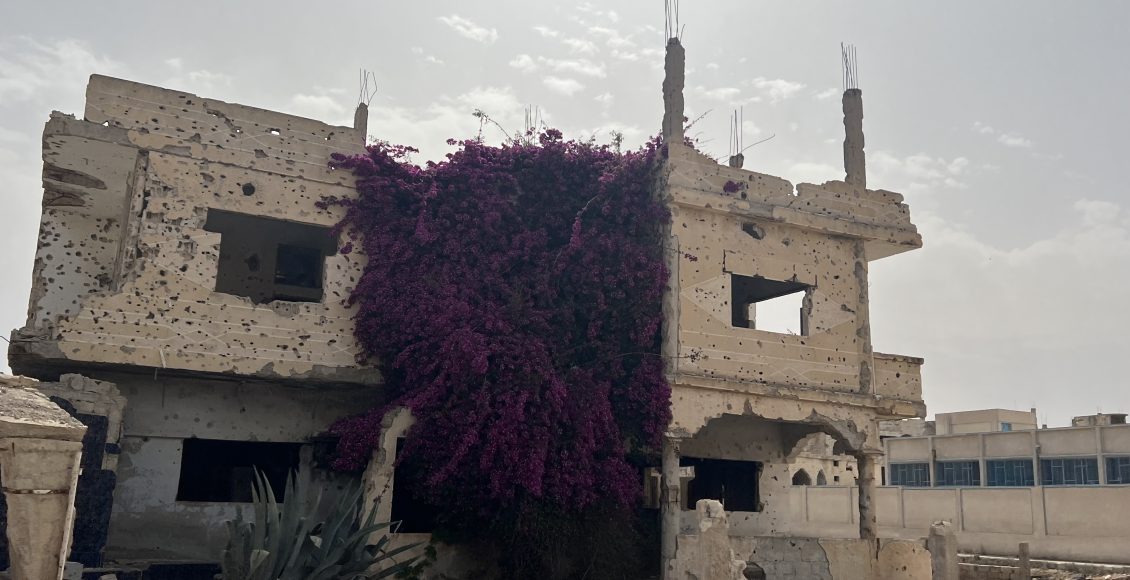– Five months have passed since the fall of the Syrian regime, yet the celebratory ‘Arada’ still glides effortlessly through the airport. The return of the exiled is welcomed with traditional songs, dance, and undimmed joy.
– An influencer, barely three minutes off the plane and before stamping his passport, goes live from the arrivals hall. He calls on his followers to return home: “Come back—your country needs you. The feeling is indescribable, and everything is just perfect.”
– Currency exchange offices have reopened at last, and the patchwork of curbside currency sellers—those vending chewing gum, cigarettes, and stacks of Syrian pounds—has thinned. Still, it’s never long before a man leans out of a car window, waving bundles of cash: “Exchange? Exchange?”
– Although travel bans have been lifted for thousands, mine remains—filed by the fallen regime and still live in Interpol’s system. I’ve been sucked back into the bureaucratic whirlpool. (CC: to Mr. Influencer in the arrival hall.)
– At the Palace of Justice, I had to submit fingerprints for a power of attorney. The lawyer offered me a tissue to wipe my ink-stained finger. “Leave it,” I told him. “Let me pretend I’m voting.” The clerk, glancing at my place of origin—Idlib—while signing the form, said: “You’ll never vote again under the new government.” I shrugged. “No difference then. I didn’t vote before, and I won’t now.”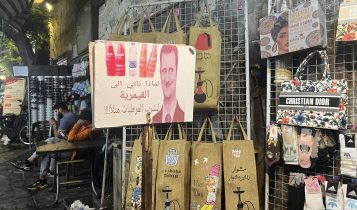
– According to my lawyer, nothing has changed in her field. No reshuffling of cases, no firings—except for those who handled terrorism court files.
– In a beauty salon, young women spoke in hushed tones about how much they feared Idlib and everything it represented. One mentioned a “journalist” from there who’d spoken about the ‘Alwahite women captives.’ But once they learned I was from Idlib, they backpedaled: “Oh, but we have lovely friends from there too! Not all of them are scary. They’re not all so different from us!”
– A 17-year-old Alawite girl wo lives Soumariyeh on the outskirt of Damascus won’t go to the city unless her mother is with her. She left school and studying baccalaureate exams from home—“Just in case we’re evicted from our home or neighborhood at any moment,” she tells me. She dreams of becoming a flight attendant, of escaping. Her family once tried to flee to Lebanon, but after relatives were stopped at a checkpoint and the men detained simply for being Alawite, they abandoned the idea.
– The queues outside the ATMs persist, growing longer still. Nearly everyone I’ve spoken to complains about the scarcity of Syrian currency.
– As far as I can tell, the number of unveiled women in Damascus hasn’t changed, nor has their dress code. I walk daily across the city—east to west—in short sleeves, alone, and haven’t heard a single word or faced harassment. The terrorizing videos of sexual harassers by armed men last December seems to stop sexual harassment in the city.
– A reminder: Damascus is a bubble. What happens here applies nowhere else in the country.
– Many women, passing by street cleaners, instinctively reach into their purses to hand them money.
– The filth lingers—in the streets, in buildings, in the air. The mold, the decay, the cobwebs turned to black cloth from years of dust—especially in government offices—are still there.
– The old “Hob Hob” buses have outlived the Assad family and continue to sputter through the streets, trailing thick, black smoke—choking, corrosive, explosive.
– Gas stations are back in operation, and the roadside fuel stalls that clogged every street corner just two months ago have nearly vanished.
Rhythms of Hope and Fear
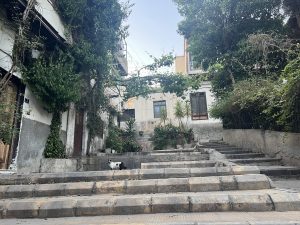 – In the old city a car blasting Saint Levant’s song “Calamentina” at full volume, followed by a tall, tinted vehicle playing a religious chant: “Glorify God, Allahu Akbar, fear not the haters.”
– In the old city a car blasting Saint Levant’s song “Calamentina” at full volume, followed by a tall, tinted vehicle playing a religious chant: “Glorify God, Allahu Akbar, fear not the haters.”
– A pop music party filled with foreigners and Syrians speaking various languages, the music alternating between English and French, all inside an old Damascene house. A glass of cola costs $3. The moment you step outside, you see a child selling tissues—each for 1,000 liras (about $0.00008).
– Five young men in Afghan-style garb, long beards, and clean-shaven upper lips stroll through the Straight Street in Bab Touma. Around them, young women walk with their hair uncovered, wearing jeans and sleeveless tops.
– At a checkpoint on the road to Daraa, one soldier wears what seems to be an old uniform with a patch reading “Al-Uqab”—the symbol once adopted by ISIS. He looks at me mid-conversation, asks where I’m heading, and says “Thank God for your safety”—without even asking who the man sitting next to me is.
– “Where did the Isreal hit?” has become the go-to morning icebreaker, along with questions about road conditions to Daraa and Sweida.
– More than three taxi drivers have talked to me about the impact of media misinformation—like the report claiming yesterday’s strike wounded people who were taken to Al-Muwasat Hospital. One driver went to donate blood and didn’t even find the staff there.
– There’s a palpable sense of fear and tension—I personally began to feel it after the attacks in Jaramana and Sahnaya. And when I tune in to the conversations of young people on the streets, I hear sectarian whispers: Alawite, Druze, Sunni… and dreams of emigration.
On The Edge of a Civil War…
– A Sunni friend from Idlib, married to a Druze woman from Sweida, came to visit Syria with their children. After the attack on Jaramana, her family fled the area and took temporary shelter in Damascus until things calmed down. My brother was helping them find a hotel. When they arrived safely, her family was afraid to meet him until their son-in-law reassured them that he was “safe”—despite being from Idlib.
The moment they saw my brother—whose warm face practically radiates kindness—the young man was drenched in sweat, his hands ice-cold.
– On the first day of a media training I was conducting in Latakia, a banana vendor passed by outside the building. Suddenly, one of the journalists turned pale and froze. The woman next to her nudged her repeatedly until she managed to stammer, “It’s just a vendor.”
She is from a village near Jableh, displaced with her family during March massacres, and had taken refuge in Latakia.
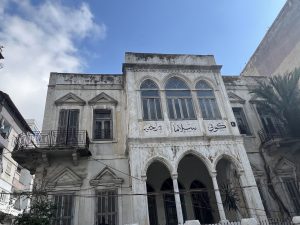
– In a conversation with a young woman working at the hotel where I’m staying, she told me about what her family in Sahnaya had been through. Then, suddenly remembering something, she asked where I was from. When I told her, she quickly added, “But I’m with the government and the president.”
– I used to think that fear was the worst feeling in the world. But I’ve come to realize that being feared is even worse.
Notes from Latakia:

– The famed Blue Beach now feels remote and desolate. The road leading to it at night is eerily dark. As soon as the sun sets, the crowds on the corniche thin out instantly. Vendors of cooked beans, manakish, corn, and nuts quickly pack up their goods and leave.
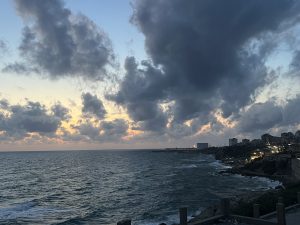
– Cars with plates from Idlib, Aleppo, and Jindires fill the streets. I found myself scanning for Idlib cars, and many were clearly family cars—not just men—out rediscovering the sea after a decade of deprivation.
– We were driving a large car with Idlib plates. You could see the fear in people’s eyes as we passed. Sometimes, even when the right of way was ours, cars would stop and let us go first. (And in Syria, where driving is a battlefield, that’s no small gesture.)
– In the mornings, I saw a heartbreaking scene repeat itself: women dressed in solid black, not a touch of makeup, hair tightly wrapped, walking briskly, eyes fixed ahead. A silent, striking presence—mourning made visible.
– In passing conversations with hotel staff and at the media center where I held my journalism workshop, nearly everyone had stories of horror, of family lost in the March massacres. Many were displaced themselves and too afraid to return. I noticed a subtle distinction in how they spoke: they referred to “the factions” and “the militants” separately from “general security.”
– A man who sells alcohol told me a security officer from Idlib once came to his shop and said:
“We’re not here to mess with you. Just move the Arak under the counter. Those who want it will find you. If a foreign jihadist comes and attacks you, we can’t do much.”
And it happened. An Uzbek, he guessed—did show up and spray bullets into the shop. The seller survived by sheer luck.
– The Alawite-majority neighborhoods at night reminded me of my time in Aleppo, when the regime controlled the west and rebels the east: darkness, fear, silence. Yet just a few blocks away, life went on as usual.
– At a large café in the “American neighborhood”, tables were full—groups of women smoking shisha and playing cards at 11 p.m., crowds of young people filling the massive space. A cleaning lady passed by, and a guy sitting behind me asked her, “How are things on your side?”
She smiled and replied, “Today’s good. God knows about tomorrow.”
– Aside from the work with the women journalists, two things made this trip beautiful:
— the roasted fresh green Hummus sold everywhere, and
— reconnecting with my brother Bayan, who I hadn’t seen in years. He volunteered as my driver, coordinator, escort, even my unofficial chaperone—and still managed to treat me to an incredible fish dinner.
Farewell
– I left Syria this month with a heart built on love—a love for the margins, the overlooked, the kind majority, the fearful, and the strange contradictions that only happen in your own country.
– For the warm, fleeting conversations with people in the streets and public places—filled with complaints, hope, kindness, anger, and a relentless energy despite everything that’s happened.
– For the woman who leans out her window, and when she saw me looking up at her, greeted me and invited me for coffee.
– For the valet of a nearby restaurant whom I chatted with daily with about the neighborhood cats. Once I asked him about a sick white kitten who wasn’t eating. He got excited waiting for me to come back so he could tell me about a young vet trying to help, and about a guy who took it upon himself to feed all the neighborhood cats every day.
– For the young man working at a hotel who is a previous soldier who handed over his weapons to the authorities and got “settled”, but still in fear to move outside his area because he’s Alawite. He’s waiting for his civil ID to leave the country. He trusted me despite knowing I’m from Idlib. He’s the one I called every time I needed hot water for a shower; he fixed dinners when I was hungry, and whom I had to fight with to let me pay my share! “You guys run a hotel; I am a customer not a guest” I had to say.
– For the young woman at airport security who, when I asked why I set off the metal detector carrying 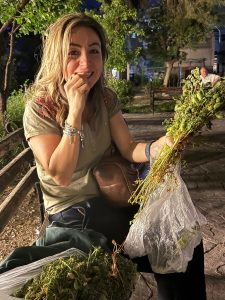
– For the clerk at the courthouse who apologized for the wait, his kind face shining despite hundreds of people waiting and a salary that couldn’t even buy two kilos of meat.
– For the Idlib delegation who welcomed me at the airport, and the friend from Idlib who calls every evening asking, “Do you need anything?” My personal money exchanger, who brings me food and fresh green Hummus with the exclusive service.
– For the journalists from Sweida, who despite the chaos struck their area, with violence and fear of the unknown, they sent messages to check on me after I had a car accident on my way to visit them.
– For the arguments with the young men and women of Daraa because I couldn’t eat Mlihi when I visited—my stomach too tight from the sound of warplanes and the attacks on Sahnaya.
– For the women journalists in Damascus and Latakia who opened their hearts to me, sharing their stories. We grew together, breaking through our tribes and stereotypes, laughing, crying, getting angry, smashing the rigid molds pushed on us to stay trapped in extremism—and we still haven’t been defeated.
– For the strange things that only happen at home—like staying awake until three in the morning in a hotel listening to the cries of displaced children from Jarmana playing in the yard, and not feeling the nearby Israeli strike; or going to get something for a friend from a café in the afternoon and finding yourself wandering Damascus late at night, with a man from Daraa singing Aleppine Qudud for you.
After nine years of serious attempts to close the chapter of this country from my life—professionally and emotionally—after repeated betrayals, I must admit: I have fallen again. It is the scary love again.
